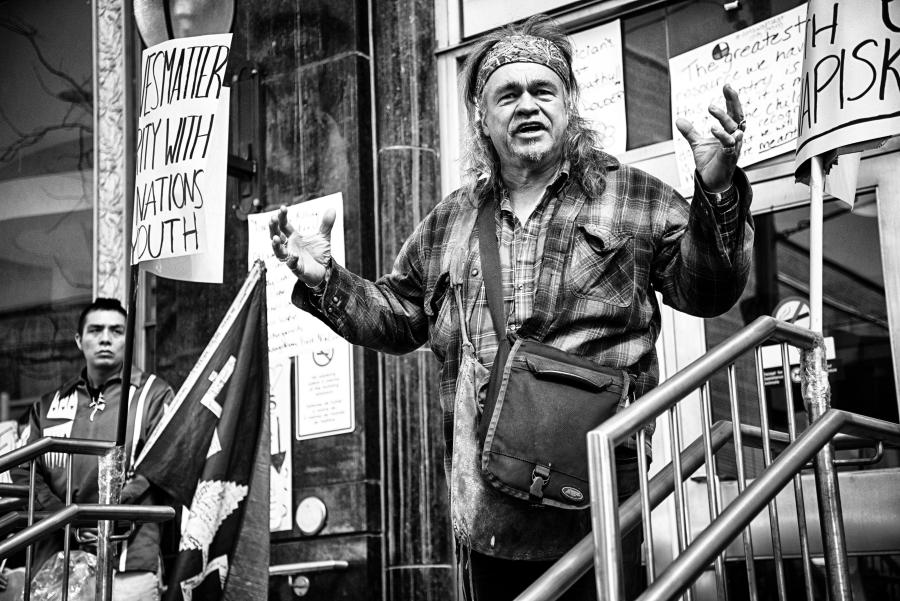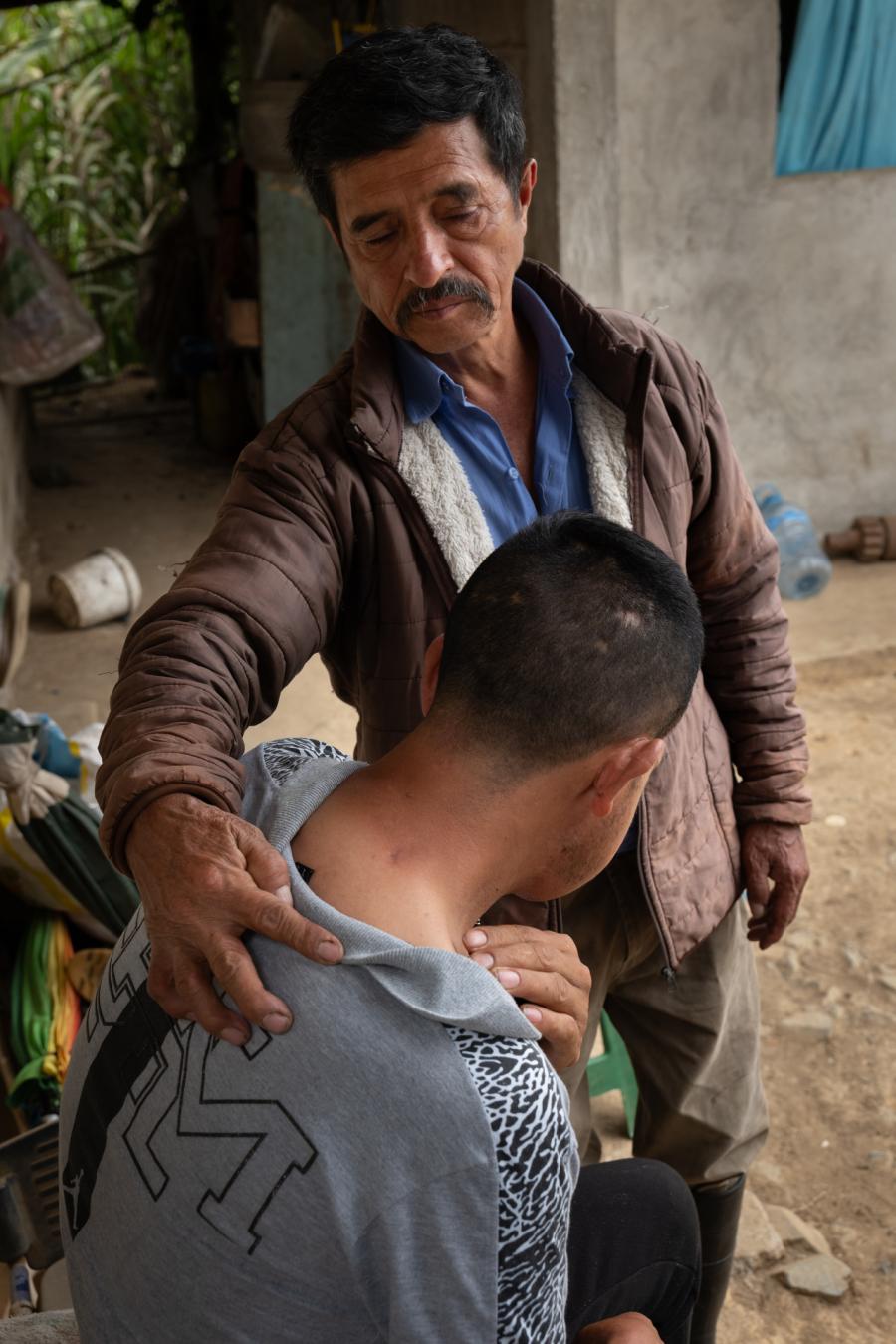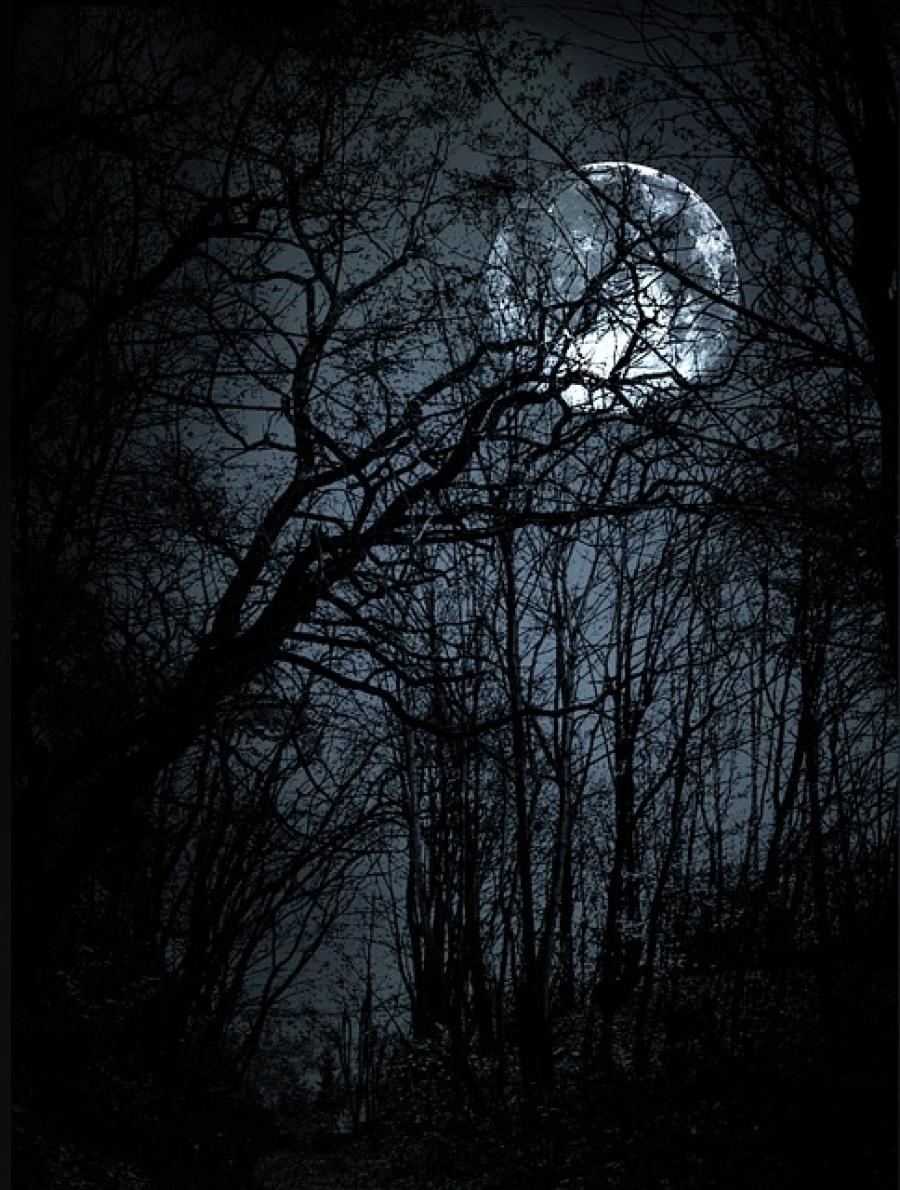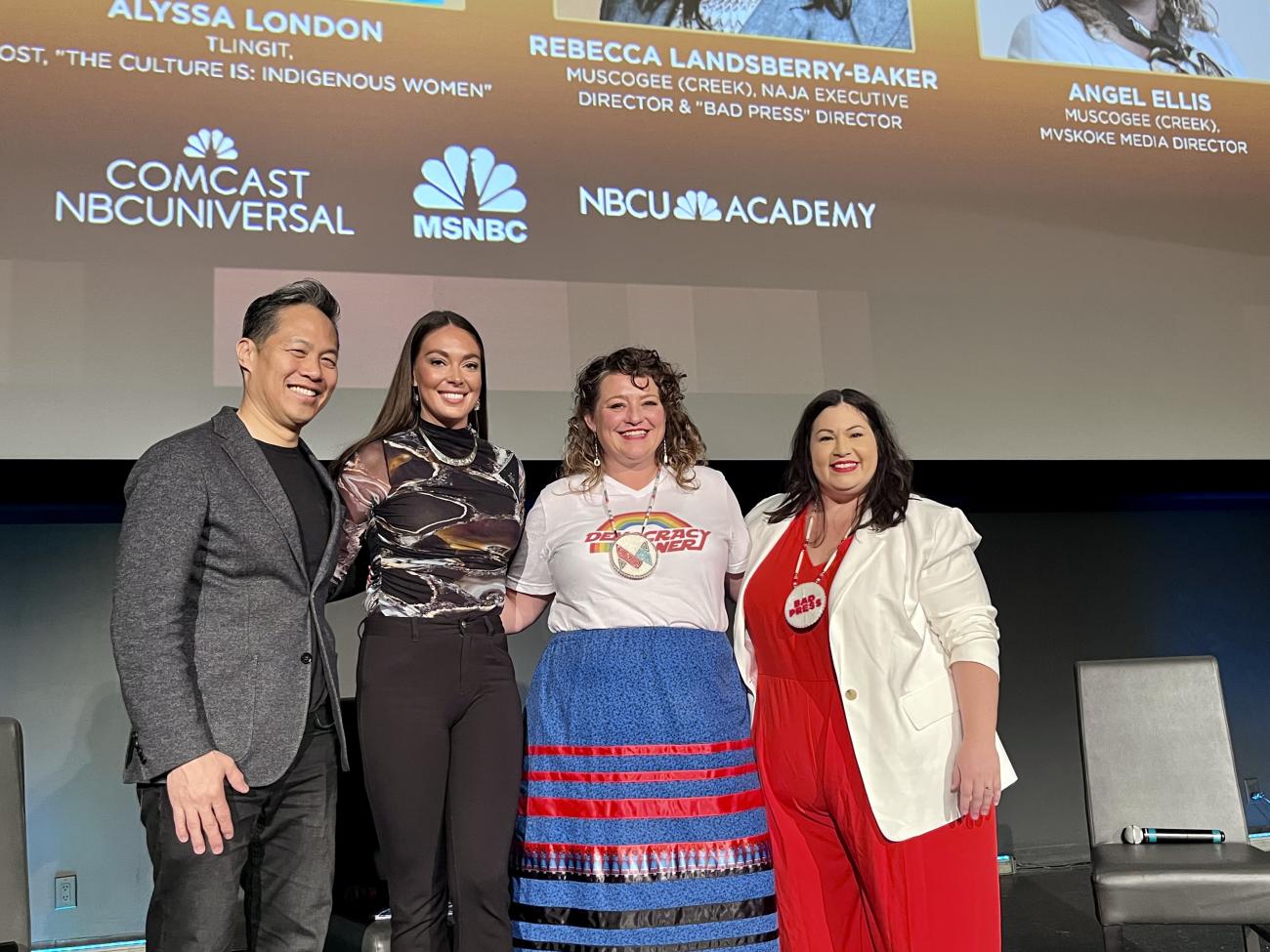
By Phoebe Farris (Powhatan-Pamunkey)
At this year’s National Native Media Conference, held August 10-12, 2023, in Winnipeg, Canada, members of the Native American Journalists Association voted to change their name to the Indigenous Journalists Association (IJA). President Graham Lee Brewer (Cherokee) issued statements about international Indigenous journalists asserting themselves in newsrooms as the rightful storytellers of their own narratives and stressed “connecting with our brothers and sisters across the globe from Canada to New Zealand.” Addressing members at the conference and in postings, Brewer and other IJA staff and board members emphasized the universal struggles Indigenous people face in print and TV news media and the challenges of working within structures that were not designed for Indigenous people to thrive.
NAJA/IJA recognizes that Indigenous Peoples north and south of the Medicine Line (also known as the U.S.-Canadian border), throughout Turtle Island, and around the world are distinct groups based on their own traditions and cultures. The organization sponsors journalism programs that promote diversity, defend challenges to freedom of speech, and encourage both mainstream and Indigenous media to attain high standards of professionalism, ethics, and responsibility.
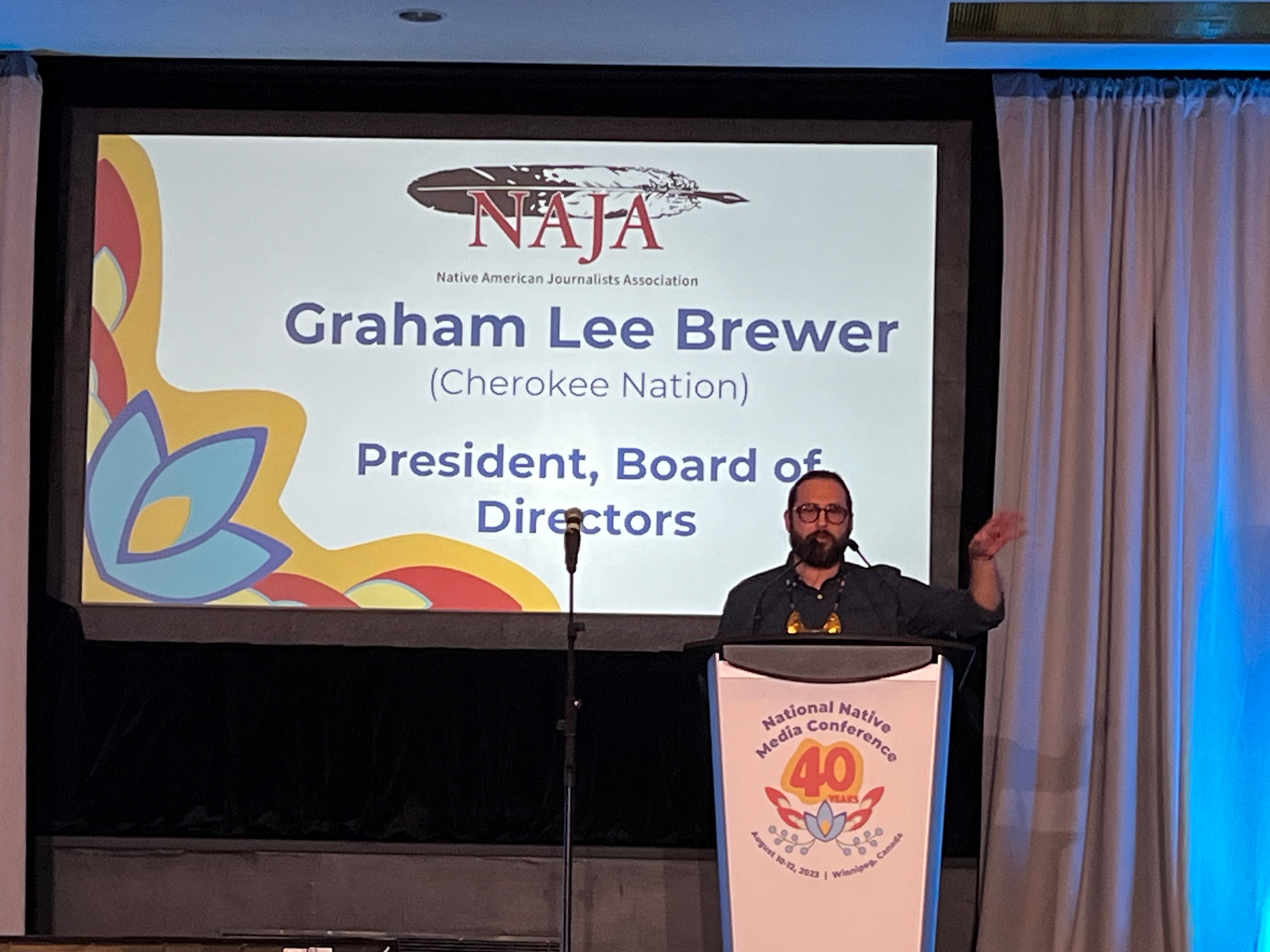
Graham Lee Brewer (Cherokee), outgoing President of the IJA Board of Directors.
Changing the name from the Native American Journalists Association to the Indigenous Journalists Association presented challenges for many members, but Brewer’s comment that “We live in a time when it is possible to connect and create deep, meaningful relationships with Indigenous journalists no matter where they are, and we look forward to helping them find each other to share their knowledge and support,” helped to clarify the importance of this significant transition.
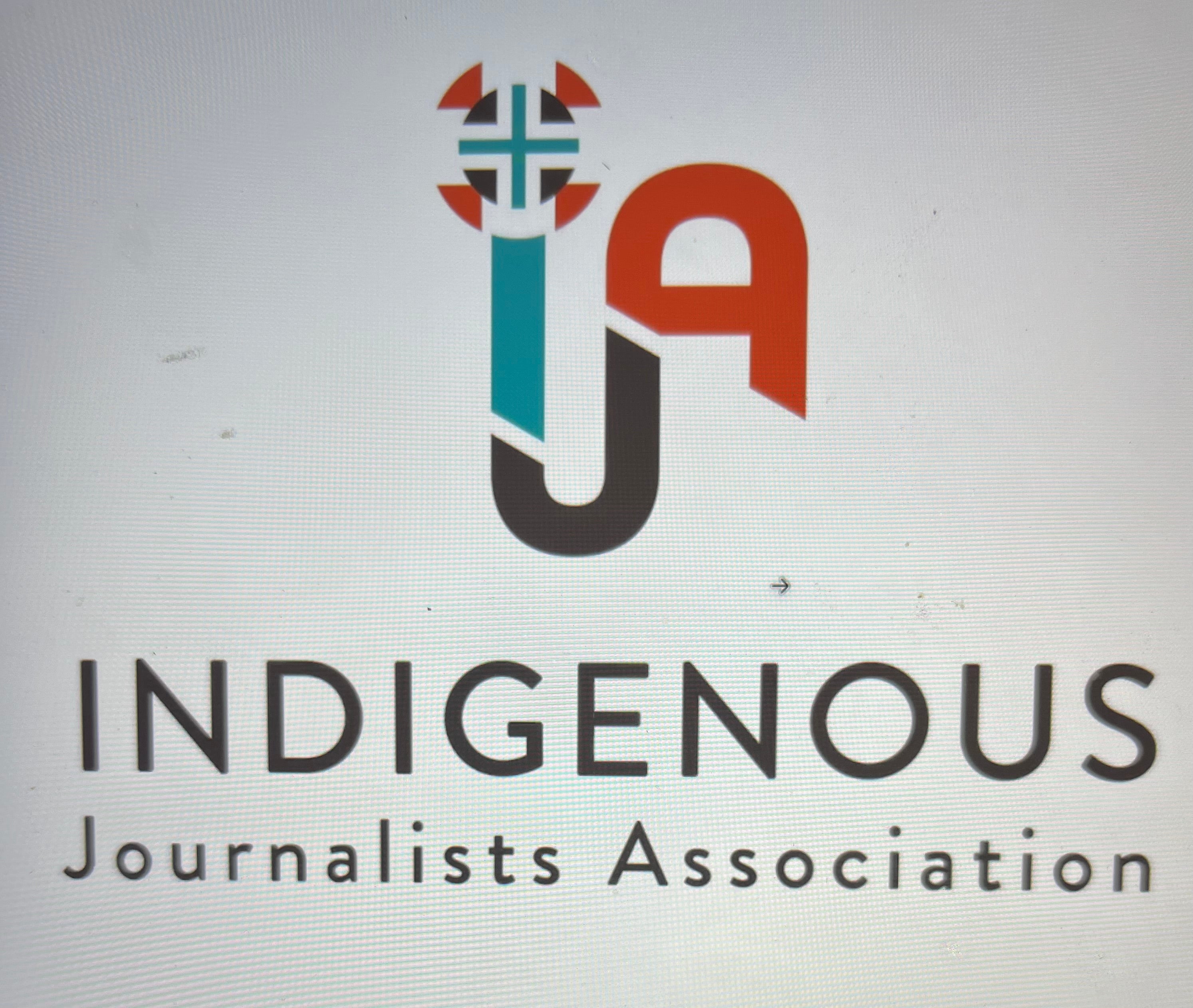
In addition to academic research papers and panel discussions, the National Native Media Conference featured special events including film screenings at an off-site theater, live performances, award ceremonies, and a silent auction. Each day there were oral land acknowledgments, in addition to the land acknowledgment at the hotel’s entrance that recognized Treaty 1 Territory, Crossroads of the Ojibway, Cree, Oji-Cre, Dene, and Dakota Peoples, the Red River Valley--the birthplace of the Métis, Inuit relatives in the north and the ancestral lands they call home, and water sourced from Shoal Lake 40 First Nation.
The opening reception included entertainment from the Norman Chief Memorial Dancers. Founded in 2004 in memory of the late Norman Chief, a Manitoba musician, singer, and entertainer, the group performs traditional style Métis music and dance, especially fast-paced jig dancing that includes audience participation.
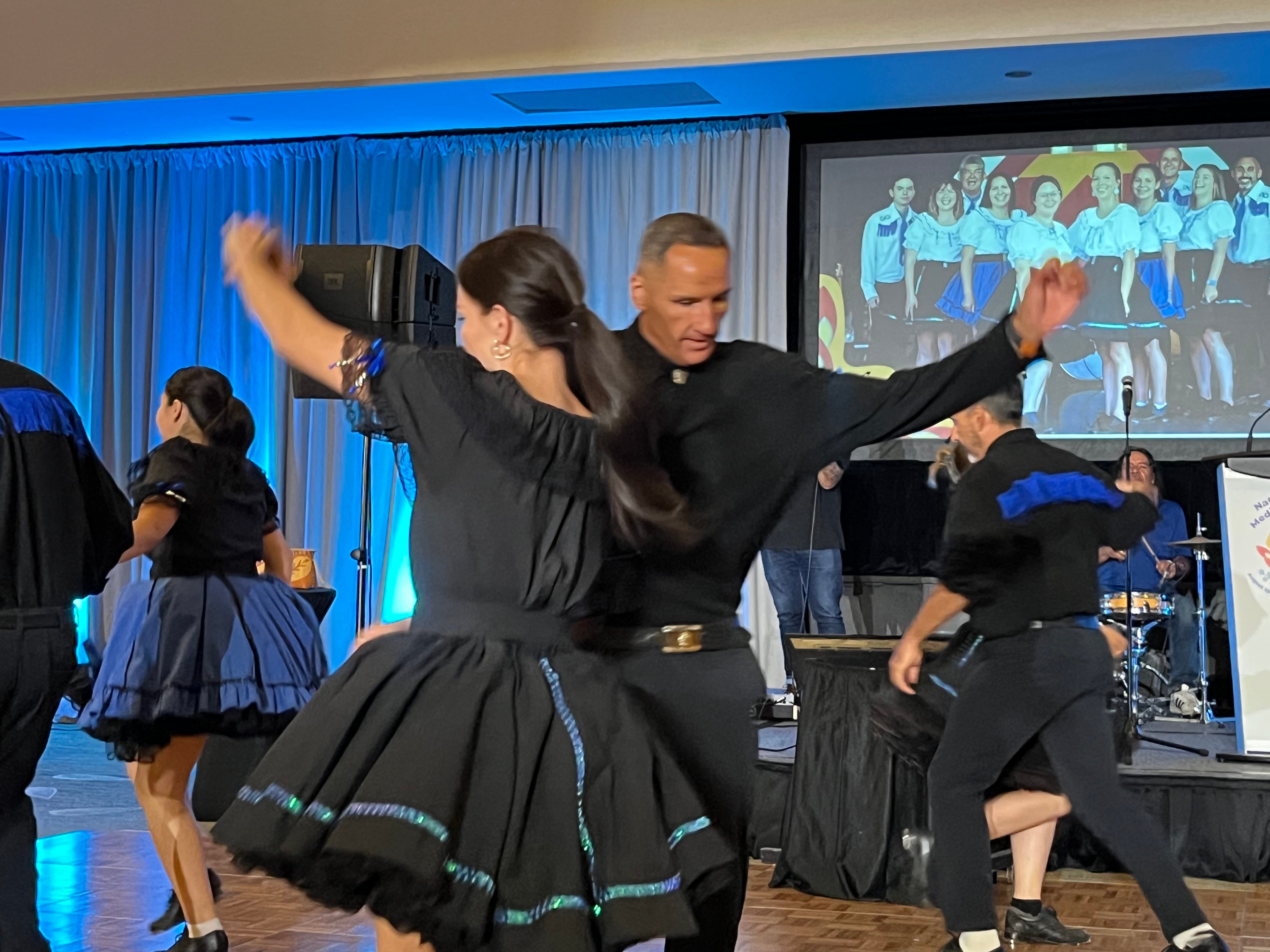
Norman Chief Memorial Dancers. Founded in 2004 in memory of the late Norman Chief, a Manitoba musician, singer, and dancer who promoted traditional Métis music and dance.
Off-site film screenings featured directors, producers, filmmakers, and cast Q&As. MSNBC’s “The Culture Is: Indigenous Women,” hosted by network contributor Alyssa London (Tlingit), led off a roundtable discussion of activist Indigenous women who shared how they overcame adversity to reach their respective career goals while caring for family and advocating for their Tribal communities. After the screening, London, IJA Executive Director and award winning “Bad Press” co-director Rebecca Landsberry-Baker (Muscogee), Mvskoke Media director and “Bad Press” star Angel Ellis (Muscogee), and moderator Richard Lui, MSNBC anchor and documentary filmmaker, participated in a lively Q&A.
CBC Radio hosted a private screening of “Bad Press,” followed by a Q&A with co-directors and producers Landsberry-Baker and Joe Peeler, and Ellis, moderated by Bryan Pollard (Cherokee) from the Associated Press. The film deals with the Muscogee Nation’s censorship of their free speech by Tribal officials, the reporters who fought to expose their Tribal governments’ corruption, and how that struggle impacted other Indian Country Tribal media.
A wide range of topics was covered at the conference, including reporting on repatriation, covering climate in global Indigenous communities, post-secondary education opportunities, freedom of information, community broadcasters and the importance of local news, reporting on boarding and residential schools, 2SLGBTQ+ community needs, and free digital tools and techniques for journalists.
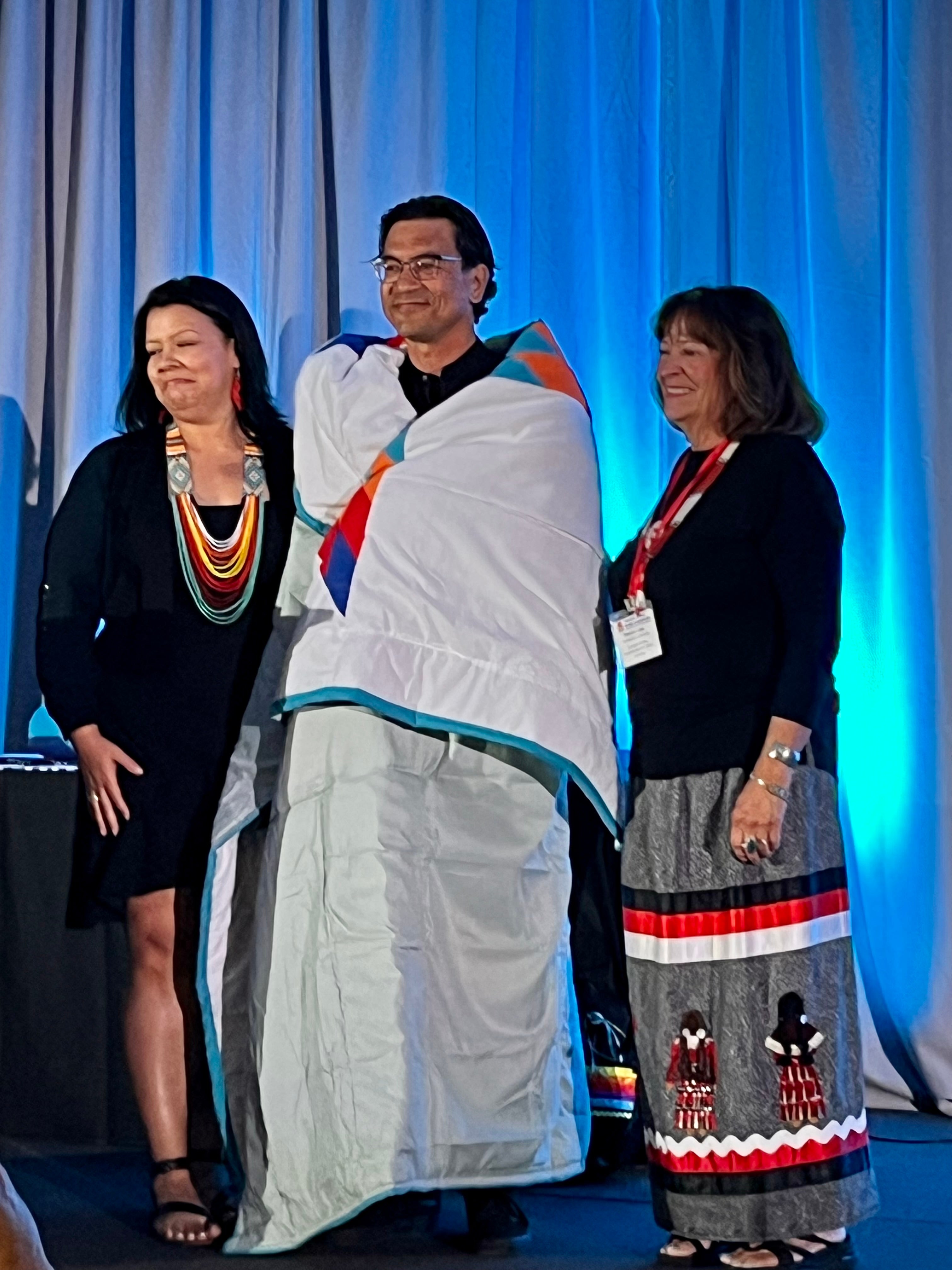
Duncan McCue, recipient of the 2023 NAJA Medill Milestone Achievement Award, receiving a Star Quilt. On the left is Francine Compton (Sandy Bay Ojibway First Nation) and on the right, Patty Loew (Bad River Band of Lake Superior Ojibwe).
A highlight was the Native Media Award Banquet, where IJA presented the Richard LaCourse Award for Investigative Journalism to Graham Lee Brewer (Cherokee), the Elias Boudinot Free Press Award to the Aboriginal Peoples Television Network, and the Tim Tiago Free Press Award to Jodi Rave Spotted Bear (Mandan, Hidatsa, and Arikara Nation/Lakota). Attendees also had the opportunity to shop for Indigenous art, clothing, jewelry, beaded items, and books during the silent auction that raised funds to benefit the IJA scholarship fund.
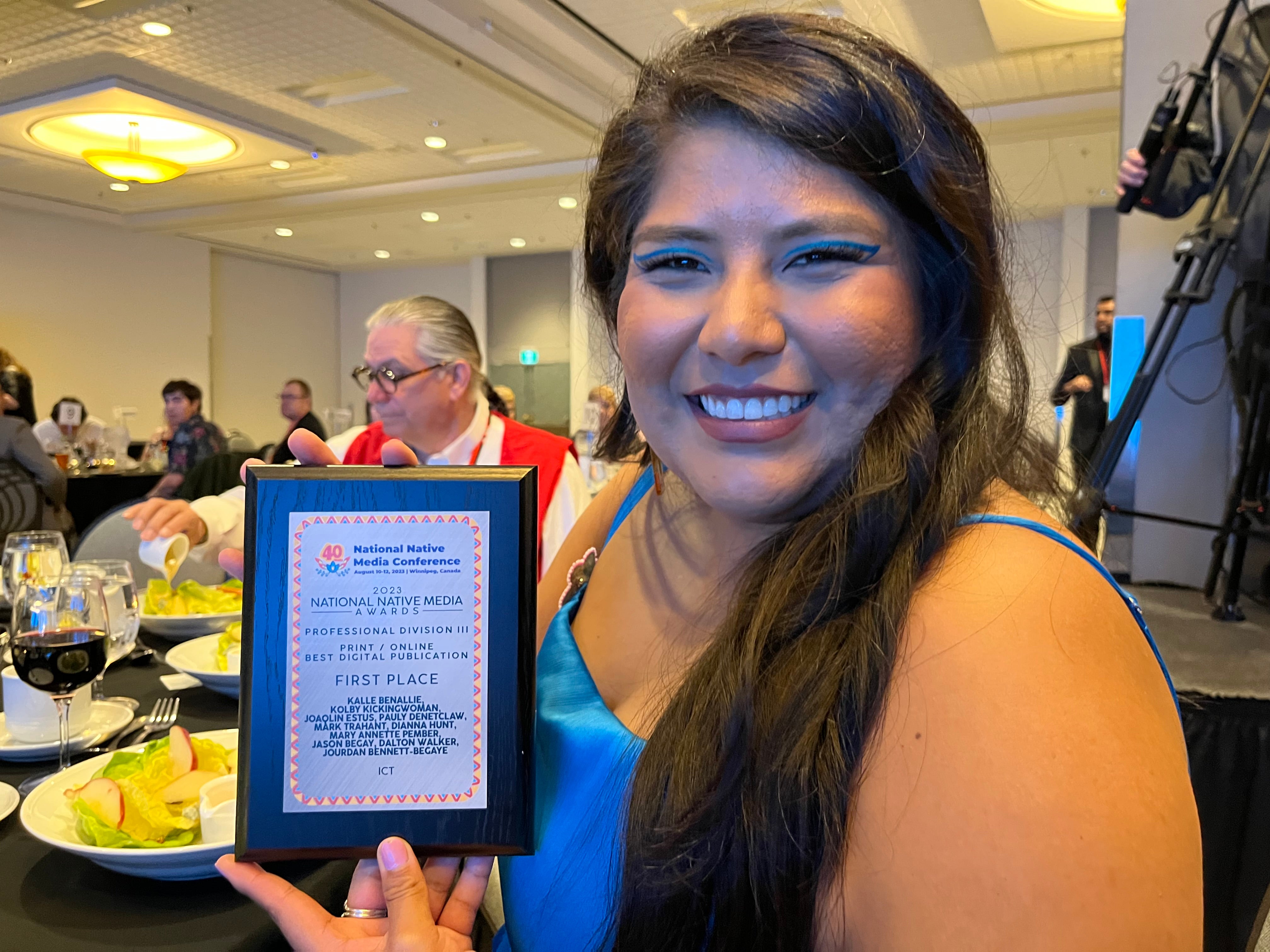
Jourdan Bennett-Begaye (Dine’) from Indian Country Today, holding her award for Professional Division III Print/Online Best Digital Publication.
Featured Speakers
Among the many speakers, presenters, and award recipients were Darrell Stranger (Oji-Cree Peguis First Nation), anchor/producer of Aboriginal Peoples Television Network National News; Grand Chief Kathy Merrick (Cross Lake Band of Indians); Stephanie Scott (Roseau River Anishinabe First Nation), Executive Director of the National Centre for Truth and Reconciliation; Loren Tapahe (Navajo), publisher of Native Scene Publishing and first Vice President of the former Native American Press Association (now the IJA); Jim Compton, founder, executive producer, host, and programming director of APTN; Hevyn-Lee Martens (Brokenhead Ojibway Nation), youth coordinator for Treaty One and On-Reserve Brokenhead representative for Treaty One’s Promise Keepers Youth Council; Duncan McCue (Chippewas of Georgina Island First Nation), CBC broadcaster and Associate professor of Carleton University’s School of Journalism and Communication; Chief Gordon Bluesky (Brokenhead Ojibway Nation); Patty Loew (Bad River band of Lake Superior Ojibwe), Professor at Northwestern University’s Medill School of Journalism and director of the Center for Native American and Indigenous Research; Darren Brown (Cochiti/Choctaw), former NAJA board member, currently serving on the Station Advisory Committee of Native Public Media; Madeline Allakariallak (Inuk), director of production and post-production at Tagramiut Nipingat Inc.; Jodi Rave Spotted Bear (Mandan, Hidatsa, and Arikara Nation/Lakota), founder and Executive Director of the Indigenous Media Freedom Alliance; and Graham Lee Brewer (Cherokee), national investigative reporter for NBC News and outgoing president of IJA.
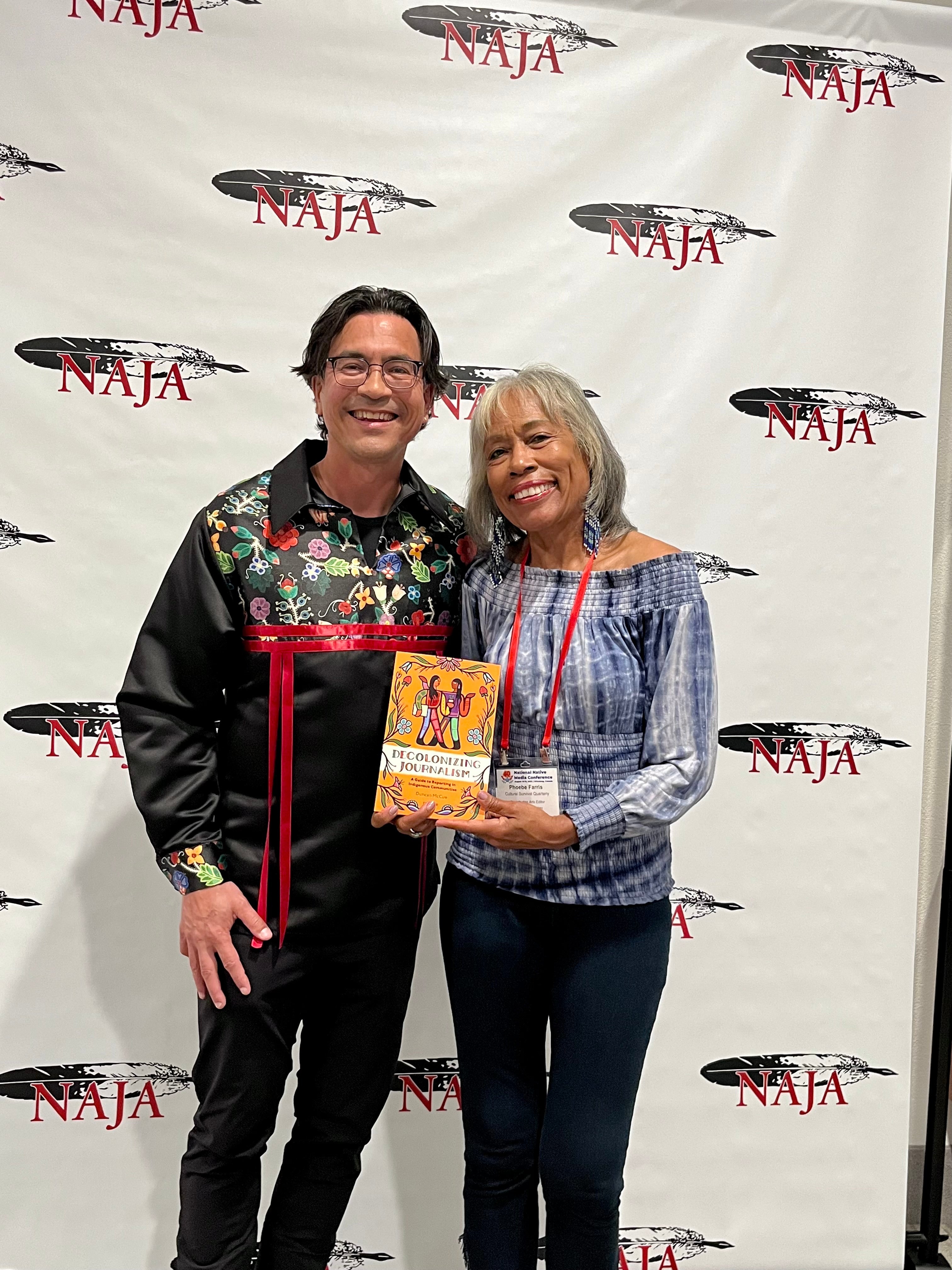
Phoebe Farris after winning the silent auction for Duncan McCue’s book, “Decolonizing Journalism.”
Many thanks to IJA staff Rebecca Landsberry-Baker (Muscogee Nation), Executive Director; Francine Compton (Sandy Bay Ojibway First Nation), Associate Director; Sterling Cosper (Muscogee Nation), Membership Manager; Justine Medina (Navajo Nation/Ho-Chunk/Menominee), Program Manager; and Sheena Roetman (Lakota/Muscogee Nation), Education Manager for their hard work to make a memorable experience for all of us.
--Phoebe Mills Farris, Ph.D. (Powhatan-Pamunkey) is a Purdue University Professor Emerita, photographer, and freelance art critic.
Top photo: L-R: Richard Lui; Alyssa London (Tlingit); Angel Ellis (Muscogee Creek); Rebecca Landsberry-Baker (Muscogee Creek), recipient of U.S. Documentary Special Jury Prize: Freedom of Expression at the 2023 Sundance Film Festival.
Photos by Phoebe Farris.
